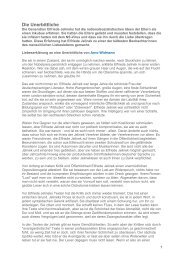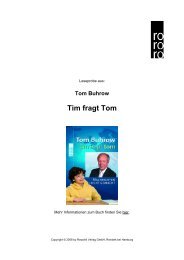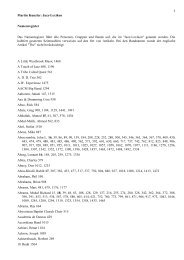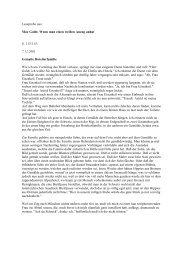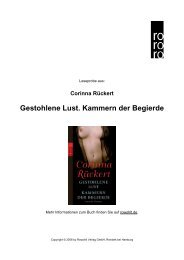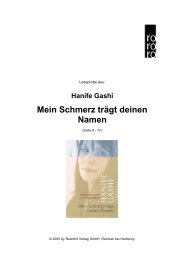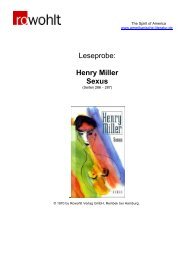Rowohlt Verlag – Highlights
Rowohlt Verlag – Highlights
Rowohlt Verlag – Highlights
Create successful ePaper yourself
Turn your PDF publications into a flip-book with our unique Google optimized e-Paper software.
<strong>Rowohlt</strong> <strong>Verlag</strong> <strong>–</strong> <strong>Highlights</strong><br />
Eugen Ruge<br />
In Times of Fading Light<br />
fiction<br />
432 pages<br />
September 2011<br />
Enthrallingly expansive in its geographical and temporal sweep, this<br />
story of a German family tells of years spent in exile, of the<br />
revolution of 1989 and beyond. The masterful narrative makes halt<br />
in Mexico, Siberia and East Berlin, climbing the summits and<br />
charting the abysses of the 20th century along the way. The result is<br />
both a stunning panorama and a monumental German novel that<br />
makes history itself tangible through the history of one family. A<br />
novel of immense stature, founded on its humanity, its precision<br />
and its humour.<br />
In Times of Fading Light focuses on three generations. The<br />
grandparents, Charlotte and Wilhelm, still convinced Communists,<br />
return to the fledging East Germany at the beginning of the 1950s<br />
to do their part in establishing the new state. Their son Kurt returns<br />
from the other direction, having emigrated to Moscow and found<br />
himself banished to Siberia. He returns with his Russian wife to a<br />
country mired in petit bourgeois values, yet also brings with him an<br />
unwavering belief that they can be changed. The grandson,<br />
meanwhile, feels increasingly constricted in a heimat that was not of<br />
his choosing, and heads to the West on the very day that his<br />
grandfather, the family patriarch, turns 90. The glittering lights<br />
of a political utopia that once shone enticingly seem to be<br />
gradually fading as time wears unwaveringly on.<br />
In Times of Fading Light is a novel about a family and about a<br />
political ideology. Carefully composed, this novel is a piece of art, yet<br />
it seems absolutely effortless and accessible, a book for a wide<br />
audience of readers.<br />
Please contact:<br />
Ms. Carolin Mungard<br />
Foreign Rights Director<br />
Phone: +49 40 72 72 - 257<br />
Fax: +49 40 72 72 - 319<br />
E-Mail: carolin.mungard@rowohlt.de<br />
� Winner of the German Book Prize<br />
� Winner of the Alfred-Döblin-Prize<br />
� 50,000 copies sold since publication<br />
� Rights sold to Italy (Mondadori), Finland (Atena), France (Éditions Les Escales),<br />
Netherlands (De Geus), Spain (Anagrama) and the U.S. (Graywolf Press)
Eugen Ruge: In Zeiten des abnehmenden Lichts<br />
Sample translation by Jerome Samuelson<br />
1966<br />
Ten years ago that very month they’d come out of Russia. The same pale sky had shrouded the<br />
fields. Here and there, if one looked closely, buds sprouted already, but from a distance the<br />
countryside had been just as drab as today, the towns just as deserted, and Kurt remembered<br />
staring out the window of the van at the out there: supposedly his native soil.<br />
For the occasion they’d spent the last of their money on gold teeth, a front tooth for each, so they<br />
would look ―respectable‖ in Germany. They’d stowed their ―good‖ things in an extra little<br />
suitcase so they could put them on just before arrival after several days’ on the train, but the very<br />
moment Kurt disembarked and saw Charlotte and Wilhelm on the platform he felt shabby in his<br />
carefully-mended coat and shapeless trousers that just before debarking had still seemed adequate<br />
to him. Wilhelm had special-ordered a van, clearly expecting a huge amount of luggage, but<br />
when they’d gone through their things in Slava almost nothing seemed suitable for life in<br />
Germany. Their possessions reduced themselves to two valises and a backpack. He’d ended up<br />
taking less out of the Soviet Union than he’d brought into it twenty-two years earlier, when he<br />
was fifteen.<br />
He’d been thirty-seven when he returned, and even though he received—as a kind of restitution—<br />
an immediate appointment to the Academy of Science (that is, the ―correct‖ academy, as Kurt<br />
liked to emphasize in order to clearly distinguish it from the Neuendorf Academy), his new start<br />
had been anything but easy. He was probably the oldest doctoral student the Institute had ever<br />
had. Twenty-two years in Russia had tainted his German. He didn’t know what was permissible<br />
and when one should laugh. Coming from a world where ―good morning‖ was the f-word, he had<br />
no sense for how to interact with dignitaries, let alone for appreciating the subtle network of<br />
alliances and animosities in the socialist scientific establishment. For a whole year a rather wellmeaning<br />
superior thought he had to keep him occupied translating Russian texts. Even three<br />
years later he’d mostly been accompanying his boss to Moscow as his interpreter.<br />
He’d just been to Moscow again. And even though the city had never seemed so dirty, so rough,<br />
so stressful as during this visit—the long distances, the drunks, the ubiquitous ―officials‖ with<br />
their glum faces, even the famous Metro (of which he’d always been a bit proud, since he’d<br />
participated in its construction as a young man in the Subotniks) had gotten on his nerves, the<br />
crowds, the noise, the guillotine-like slam of the automatic doors (and why did this damned<br />
Metro lie two hundred meters beneath the earth and—even more astonishing—why hadn’t he<br />
wondered about it at the time?); on Red Square his camera had slipped from his grasp, and in the<br />
Novodevichy-Cemetery, where conscience mandated a ceremonial visit (because he’d been there<br />
with Irina to honor the graves of Chekhov and Mayakovsky) he got caught up in a cold rain, an<br />
April rain such as only Moscow can offer, capable of killing people—as unpleasant and abhorrent<br />
© 2011 by <strong>Rowohlt</strong> <strong>Verlag</strong> GmbH, Reinbek bei Hamburg<br />
English translation © Jerome Samuelson
as all that had been, he couldn’t deny that he’d also felt gratified by the sudden regard that they in<br />
this country were now showing him, after ten years: the ex-prisoner, ―banished for life‖.<br />
Last time—accompanying his boss—he’d had to share a hotel room with a Rumanian colleague.<br />
This time they’d even picked him up at the airport and he’d gotten a double room to himself at<br />
the Hotel Peking (although idiotically lacking a bath—typical for the pompous hotels of the<br />
Stalinist era). The renowned Yaroslavsky had waxed enthusiastic over his new book, had<br />
introduced him as the expert in his field and eventually even undertaken a personal tour of the<br />
city, and Kurt had felt malicious pleasure in concealing how familiar he was with it all: the<br />
Manezhnaya, the Hotel Metropol and…oh, look, the Lubyanka…<br />
It was only the inadvisable flirtation with the little Soviet historian that he’d rather have forgone,<br />
Kurt thought, as the Trabbi, with a melodic sigh, weaved through one of the featureless locales, a<br />
Mahlow or Kahlow—since Kurt usually took the train he still didn’t know the names of places on<br />
the southern bypass of Berlin. Doing such things among colleagues was stupid. Moreover, the<br />
woman wasn’t particularly attractive, even—compared with Irina—shamefully unattractive, but<br />
with one look, one glance, he was finished. It had to be. Recently on television (West German<br />
television, of course) he’d heard about a theory according to which all art, all science, all human<br />
striving had one ultimate goal: the act of sex. Nonsense of course, from a Marxist standpoint.<br />
But still somehow not to be rejected out of hand.<br />
—So tell me, Irina inquired. How was it?<br />
—Stressful, Kurt said.<br />
And that was the real truth.<br />
And it also was the real truth that he’d been at the Archive every day. And that he’d had to give<br />
an unscheduled lecture at the symposium. That the publisher had given him an advance and that<br />
the newspaper editors had requested an article. That Yarusalimski had invited him to dinner and<br />
given him a tour of the city—all of this was the truth, and as he spoke he almost began to believe<br />
that with all of this there had been absolutely no time for a fling.<br />
That he’d also felt longing—was the real truth. And that he’d been lonely amidst all the welldisposed<br />
people, none of whom however he knew particularly well, that he might have dared to<br />
even hint at the issues that bothered him—for instance, the question of the extent to which his<br />
colleagues thought that the danger of re-Stalinization in the Soviet Union was possible after the<br />
loutish but nevertheless congenial reformer Nikita Khrushchev (without whom Kurt would still<br />
be ―banished for life‖ beyond the Urals )had been removed as Party Chief.<br />
—And I was at the Novodevichy, he said.<br />
And Irina said:<br />
© 2011 by <strong>Rowohlt</strong> <strong>Verlag</strong> GmbH, Reinbek bei Hamburg<br />
English translation © Jerome Samuelson
Would you light me a cigarette?<br />
What she actually said was: vood yoo lite me zigaret? And Kurt said:<br />
—I lite yoo zigaret.<br />
He lit two cigarettes, one for Irina, one for himself. Inhaled the smoke and now really felt the<br />
exhaustion that his tale about stressful Moscow had evoked. He was even shivering. He<br />
observed his shamefully attractive wife and, already a little excited, thought about the evening<br />
that lay before him.<br />
Sasha had preferred to stay home. It used to be that he’d never have missed an opportunity to<br />
come along to the airport, but the phase in which he wanted to become an aircraft designer had<br />
passed. Instead he was now taping the latest styles of music on American Sector Radio with his<br />
recorder and running around until dawn with questionable friends, among them a fast girl from<br />
another section of his class who came from a semi-asocial background and already at twelve<br />
packed an impressive bosom under her grubby blue sweater.<br />
Sascha’s reaction to the little gift Kurt brought him from Moscow was accordingly restrained —it<br />
was Yuri Gagarin’s Moja doroga w kosmos, Road to the Stars.<br />
—Thank you, he droned, without glancing at the book.<br />
He had to start paying more attention to the boy, Kurt decided. His Russian was getting<br />
increasingly rusty. Even his progress in school left something to be desired; recently he’d<br />
brought home a ―C‖. A ―C‖! Kurt couldn’t remember ever having gotten a ―C‖. A ―C‖, Kurt<br />
figured, was already in the indecent range.<br />
He’d futilely sought a gift for Irina in Moscow. What could one get for Irina? Irina was virtually<br />
allergic to any kind of Russian folk-art, and besides, Kurt had concluded that actually, in the Land<br />
of the Great Socialist Revolution, only crap was available. So at the last minute he bought a<br />
bottle of ―Sovietskoye Champagnskoye‖ that, after Sasha was in bed, he unwrapped with<br />
sweeping apologies. Then he took a hot bath. Irina uncorked the Champagnskoye and disclosed<br />
to him, after drinking herself into a tiny buzz, the surprise: the bedroom was finished. He’d<br />
already sensed it but nonetheless was amazed…felt—yet again—guilty before Irina…Strange,<br />
that: for five years he’d been convinced that Irina was overdoing her remodeling; for five years<br />
he’d been trying (albeit vainly) to limit the remodeling to bare essentials, and to be completely<br />
honest: what he’d really wanted was a proper paint job and be done with it. After all, he was in a<br />
hurry! Time, his postponed life, was running out. Nights he’d been getting panic attacks. It<br />
alarmed him when Irina had some walls basically ripped open, when he saw pipes and wires<br />
hanging out, all the bits and pieces that somehow had to go back into the walls. He’d even…this<br />
also happened…left the house, slamming doors, when he heard that Irina spent a huge sum<br />
because it just had to be this door, this type of wood, this shade of red. But he had to admit that<br />
© 2011 by <strong>Rowohlt</strong> <strong>Verlag</strong> GmbH, Reinbek bei Hamburg<br />
English translation © Jerome Samuelson
somehow Irina was right in the end, even (and this was puzzling) if she was always wrong in the<br />
particulars.<br />
It was a glorious, a wonderful bedroom. It was basically quite simple, only the bed, a singlepiece,<br />
frameless double (one, however, not to be had in the whole DDR) and the old wardrobe<br />
that Kurt had first simply laughed at. The carpet was white, the walls were white too; just the<br />
wall at the head of the bed was crimson, and on this wall, flanked by two light fixtures, hung a<br />
gigantic, oval mirror enclosed in a wide, baroque, gold frame, tilted in a way that left no doubt as<br />
to its purpose.<br />
—The workers probably figured that out, Kurt murmured.<br />
—And they figured right, Irina said, directing his hand under her dress, where Kurt identified a<br />
patch of naked flesh swelling subtly between slip and stockings, forming a little cushion….<br />
—Crazy, Kurt said, some time later, as they lay on the bed cuddling each other. In the<br />
champagne daze, when they’d somehow been over and inside each other, he’d even had a<br />
momentary feeling that he would duplicate himself—not just in reflection but in fact. For<br />
moments, he explained to Irina, it had seemed to him that he had more than two arms and legs<br />
and more than only one ―chui‖, he said—they used Russian for scandalous things.<br />
And Irina, still flushed, wrapped her legs around his body and whispered into his ear:<br />
—I think I should ask my friend Vera over sometime….<br />
The next morning Kurt got up late: at eight. It was Sunday, and over the years Kurt—calling on<br />
all his discipline— had gotten used to not working Sundays. He’d even gotten to enjoy work-free<br />
Sundays.<br />
He came into the kitchen in pajamas and bathrobe, stood there and declaimed, with the pathos<br />
with which he declaimed every poem, one of the four-liners he used to compose while shaving to<br />
cheer up his family.<br />
From Moscow I come a-hopping<br />
And feel my strength a-popping<br />
With cheer already a-laving<br />
I infect you all while I’m shaving.<br />
Sasha grimaced. Irina smiled in silence while pouring Kurt’s chamomile tea. —Irina insisted that<br />
he drink one cup of tea before coffee because of his stomach, and Kurt indulged her.<br />
Irina sprang it on him at breakfast: she’d be gone again for awhile. Goikowic, the Yugoslav<br />
actor and star of that Cowboy and Indian film that DEFA, the German Film Corporation,<br />
proposed to shoot, was coming today.<br />
© 2011 by <strong>Rowohlt</strong> <strong>Verlag</strong> GmbH, Reinbek bei Hamburg<br />
English translation © Jerome Samuelson
Kurt swallowed. A breadcrust stuck in his throat. Ever since Irina started working at DEFA (he<br />
didn’t actually know what as) she kept on disappointing him. […] Yes, obviously Irina had a<br />
right to work too. Even if it was pretty strange work, hanging around the DEFA guesthouse<br />
guzzling vodka with motley actors. Or driving around with this Indian… Kurt had seen a photo:<br />
Mr. Muscles. Had himself photographed half-naked. Incredible.<br />
Lunch is on the stove, Irina said. I’ll be home by four.<br />
After Irina had left, Kurt, still in his pajamas and robe, went to his room. He turned up the heat.<br />
Sat on the radiator. Examined, while his backside pleasantly soaked up the heat (yes, the gas<br />
furnace had been a good idea too!), the wall of imported bookshelves that Irina, by some dubious<br />
(hopefully not criminal) means, had managed to get him. For five years he’d been dragging<br />
boxes of his books from one room to another. Now here they stood in perfect order, a sight that<br />
always pleased Kurt—but just why he’d included Krichatzki (the tattered little Latin grammar<br />
he’d dragged around the camp for ten years) among his own work suddenly seemed unclear to<br />
him. He took the book out but didn’t quite know where to re-place it: it wasn’t for reference and<br />
didn’t fit into any period. He put it back.<br />
Then he turned to his Moscow colleagues’ lectures and journals, scraps of paper with names and<br />
addresses, the usual junk one has after such a trip. Most of it was crap, of course. After<br />
carefully transcribing them into his directory he’d never use most of the telephone numbers.<br />
Nearly all of the lecture manuscripts would lie around the room until, after an appropriately<br />
decent interval, he would throw them away. Kurt put aside the copies they’d made for him at the<br />
archive and dumped the rest into the waste basket, then retrieved the scraps with addresses and<br />
telephone numbers and sorted them. Suddenly found himself holding a nameless number, needed<br />
a few seconds to figure out whom the number belonged to …For a moment he was tempted to<br />
keep the number in revenge for Goikowic—but then he remembered last night and the golden<br />
mirror, his wondrous duplication, the promise that Irina breathed into his ear which, the moment<br />
it was made, merged with an image that was now coming to mind once again at the very moment<br />
the doorbell rang.<br />
He quickly stuffed the scrap into the pocket of his robe and strode to the door, the image evoked<br />
by the promise’s memory still lingering in his mind. It was an image from the previous summer,<br />
vacationing on the Black Sea where they’d been with Vera, coincidentally, as they’d chanced<br />
upon Vera in the transit lounge; Kurt had known her only fleetingly, one of Irina’s former<br />
colleagues from her time at the Neuendorf Academy Archive who, it had turned out, was part of<br />
their travel group and who, it also turned out, since she recently divorced, was taking a solitary<br />
retreat to Nessebar, and from there—from the beach at Nessebar—the image, fleeting as it was,<br />
passed through Kurt’s mind in the ten, twelve, or fourteen steps between the desk and the door.<br />
It had turned out that all three of them were visiting a southern shore for the first time in their<br />
lives, and all three, stepping onto the beach at Nessebar, had been surprised at how hot the sand<br />
had been. Kurt had to hop from one foot to the other and the women did likewise. There they<br />
were, all three, hopping about in an absurd little dance, and dancing along with them, revealed in<br />
© 2011 by <strong>Rowohlt</strong> <strong>Verlag</strong> GmbH, Reinbek bei Hamburg<br />
English translation © Jerome Samuelson
some miraculous manner or simply because of a loosening belt, were Vera’s things. Not coming<br />
up with any other word for them, Kurt really thought of them as things, massive, white things,<br />
laced with tiny blue veins. They were still dancing in Kurt’s face as he opened the door and<br />
beheld a round, ruddy, crooked-smiled mask that fractions of a second later resolved itself into<br />
the features of his Party Secretary, Günther Habesatt.<br />
—Oh! Kurt said.<br />
—Excuse me, Günther said, shifting from one foot to the other like he had to pee badly.<br />
But Günther didn’t have to pee. He stood awhile in the middle of Kurt’s room, still shifting from<br />
one foot to the other, expressing admiration for the building, the room, and the imported<br />
bookshelves. Declining a cup of coffee, he asked for a glass of water instead before lowering<br />
himself onto one of the already somewhat shabby lounge chairs that came from Charlottes’ house<br />
and into which Günther’s body spread out as in a bathtub. Kurt secretly despised fat people.<br />
Günther was a nice guy as a rule, helpful, not a schemer, but still a rather weak, pliant person.<br />
This, in any case, Kurt believed he could conclude from the fact that Günther, though reluctant<br />
(or in any case giving the impression of reluctance), let himself be appointed Party Secretary.<br />
They had even approached Kurt, but he had—naturally—turned it down.<br />
Once the glass of water had disappeared into his large body with no apparent swallow, Günther<br />
looked around the room again as if he might have overlooked someone. Then, with a softened<br />
voice, wobbling head, and rolling eyes, he began to explain why he was there. The matter was as<br />
simple as it was stupid. Paul Rommel, a rather high-spirited and not entirely disciplined member<br />
of Kurt’s team, had discussed in the journal Historical Review a West German colleague’s book<br />
which critically commented on the so-called United Front politics of the German Communist<br />
Party in the late twenties. Then he had sent his review to the West German colleague with his<br />
apologies for its negativity. He added that his entire team found the book clever and interesting<br />
but unfortunately the GDR hadn’t gotten nearly to the point where one could openly discuss<br />
United Front politics …<br />
To write something like this to a West German colleague was, of course, incredibly foolish, but…<br />
there was something Kurt didn’t quite get. With growing discomfort Kurt listened as Günther<br />
related the affair’s evolution which, in sum, resulted in the demand on the part of the Research<br />
Division of the Central Committee of the Socialist Unity Party of Germany (SED) for Comrade<br />
Rommel’s harsh punishment, to be decided tomorrow, Monday, at the Party meeting, and on this<br />
occasion—you know of course how it is—―spontaneous‖ statements from Rommel’s colleagues,<br />
especially those on his team, and very especially from Kurt, the team leader, were expected, and<br />
he wanted to inform Kurt beforehand, Günther explained, in confidence of course.<br />
—And how, pardon me, do you know the contents of the letter?<br />
Günther didn’t seem to understand.<br />
© 2011 by <strong>Rowohlt</strong> <strong>Verlag</strong> GmbH, Reinbek bei Hamburg<br />
English translation © Jerome Samuelson
—Well, from the Central Committee of course, he said.<br />
—And the Central Committee…?<br />
Günther rolled his eyes to the ceiling, lifted both his fat arms, let them fall and said:<br />
—Right.<br />
After Günther had gone Kurt put on some work clothes and went out into the yard. The weather<br />
was fine and one must make use of fine weather. He took out his rake but there were hardly any<br />
leaves, so he mulled over what might need pruning. But he wasn’t sure. Buds were already<br />
coming out and it was probably too late to prune. Although he’d given up any intention of<br />
pruning he kept trying, without success, to find the shears. He found some tulip bulbs instead and<br />
decided to plant them. He walked around the garden awhile looking for a suitable spot, but<br />
couldn’t make up his mind. His stomach issued a growl that Kurt decided to recognize as hunger.<br />
He took the bulbs back to the shed.<br />
Coming into the house he heard loud music from Sasha’s room. He knocked on Sasha’s door,<br />
went in. Sasha turned down the music a little. He was sitting at his desk, his tape player<br />
supporting a textbook directly before him. He was just about to write something in an exercise<br />
book.<br />
—You can’t do homework in all this noise, Kurt said.<br />
—It’s just biology, Sasha informed him, while he played with a little silver cross he was wearing<br />
around his neck on a short chain.<br />
—Oh, said Kurt. So you’re a Christian now?<br />
—Nope, Sasha corrected him. This is a hippie cross.<br />
Hippie—Kurt knew the word from television, West German television, where there was a lot of<br />
talk lately about hippies: longhaired creatures whom Kurt associated—he wasn’t sure exactly<br />
how—with the kind of music that was coming from Sasha’s tape player and who—this was clear<br />
enough—fundamentally avoided work.<br />
—So, said Kurt, now you want to be a hippie.<br />
Sasha grinned.<br />
Kurt turned around, just about to leave the room, but then stopped.<br />
—My whole life, he said, I try to show you how to work. And you…<br />
© 2011 by <strong>Rowohlt</strong> <strong>Verlag</strong> GmbH, Reinbek bei Hamburg<br />
English translation © Jerome Samuelson
And suddenly he heard himself screaming:<br />
—You’re turning into a hippie. My son wants to be a hippie!<br />
He seized the tape player, which fell silent with an anguished belch, and marched off. Not until<br />
he got to his room did he notice that he’d torn out the cord.<br />
While showering—he wasn’t really dirty but one usually showered after yard work—the scene<br />
was still running through his mind. He was angry (at himself) but tried all the harder to justify his<br />
sudden rage…Surely there was no acute danger of Sasha becoming a ―hippie‖. But his<br />
lackadaisical attitude, his laziness, his lack of interest in anything Kurt considered important and<br />
useful…How does one get across to this boy what really matters? No question the kid was<br />
intelligent, but something was lacking, Kurt thought. Something inside.<br />
For the second time in a single day Krichatzki came to mind: the little Latin book he’d carried<br />
through the camp. He considered momentarily what pedagogical use this experience might offer.<br />
That he kept working to improve his Latin proficiency even in the labor camp—something of this<br />
sort was coursing through Kurt’s mind. But he had to admit it was nonsense. He didn’t study<br />
Latin in the camp. He was hungry. And hunger had made him so stupid that sometimes he’d<br />
asked himself if the damage was still reparable. It certainly had come pretty close, Kurt thought,<br />
and vaguely recalled, as he started working his legs with the body-brush, the strange and halfinsane<br />
states of mind that possessed him, the voice that gradually took him over, detached,<br />
vigilant, and always—strangely enough—in the third person: now he is freezing…now he is in<br />
pain…now he has to get up…<br />
STOP: wrong program. Brushing after a cold shower was a morning ritual he’d inadvertently<br />
slipped into. Kurt put away the brush, examined himself in the mirror…Some day, he thought,<br />
he’d write it all down. When the time was ripe.<br />
Then he got dressed and started warming up lunch. It was beef goulash and red cabbage. Sascha<br />
came in, sans Hippie cross. Sat down at the table, hunched, his eyes boring into his plate. He<br />
poked his fork around in his red cabbage, shoving leaves into his mouth one at a time. Even now,<br />
at twelve, he had the habit of eating everything separately: meat and side dishes. But Kurt<br />
decided to overlook all this. Instead, he tried ―reasonable‖ once again:<br />
—I’ve always let you listen to your music, haven’t I?<br />
Sascha poked at his red cabbage.<br />
—Haven’t I, Kurt repeated.<br />
—Yes, Sascha said.<br />
© 2011 by <strong>Rowohlt</strong> <strong>Verlag</strong> GmbH, Reinbek bei Hamburg<br />
English translation © Jerome Samuelson
—But when your enthusiasm for beat music starts making you into a hippie, then I must say that<br />
your teachers are right when they forbid such things. Do you carry that thing around school, too?<br />
Sascha poked at his red cabbage.<br />
—I’m asking you: do you take that thing to school, too?<br />
—Yes, Sascha said.<br />
Kurt noticed renewed anger boiling up inside him.<br />
—So you’re really that dumb?<br />
Kurt, chewing two hundred times as his internist had advised, put aside his utensils and regarded<br />
his son, who continued to poke at his red cabbage. Regarded the delicate wrists (more exactly:<br />
his right wrist; the other had vanished beneath the table), the long, curving eyelashes that he’d<br />
inherited from Irina (and which annoyed Sascha because they supposedly made him look<br />
feminine), the unruly hair that came from him, from Kurt (and which caused frequent irritation at<br />
school because the small-minded director saw the influence of western, decadent youth culture in<br />
every millimeter that overlapped the ear). And suddenly he sensed a boundless, almost painful<br />
need to protect this mortal from all the uncertainty that lay before him. But how?<br />
That night his stomach was growling. In the morning Irina insisted that he try the rolling<br />
exercise. Later that morning, holding a heated pillow underneath his sweater against his stomach,<br />
Kurt tried to get a little work done on his new book about Hindenburg, then set forth with a dose<br />
of chicken soup in his belly.<br />
Party sessions were always on Mondays. Since the Wall went up the trip to the Institute had<br />
gotten long. Earlier, the S-Bahn had gone directly though West Berlin and for those instructed<br />
not to set foot in the western sectors there had been special trains that didn’t stop between<br />
Friedrichstraße and Griebnitzsee. Now there was the ―Sputnik‖ that traced a wide orbit around<br />
West Berlin. To connect with it Kurt had to take the shuttle bus to the Drewitz station, and from<br />
there go one more station to Bergholz, which lay on the Sputnik route. Fortunately he only had to<br />
go to this trouble once in a while, for one of the good things about the notorious shortages in the<br />
GDR was a lack of office space, so that workers at the Historical Institute were called upon to use<br />
their—what they termed—domestic workplaces. Kurt usually scheduled his team conferences on<br />
the mandatory Mondays and dodged the rest whenever he could, got himself excused, as a<br />
resident of Neuendorf with the longest distance to travel, from the less important events, even<br />
played hooky, excusing himself with transport delays that were hard to check or pleading his<br />
beleaguered health: the stomach problems that he, without saying it directly, attributed to his<br />
imprisonment, which usually evoked an abashed sympathy. Not that any of this had troubled his<br />
conscience. On the contrary: he regarded every missed meeting as additional time to work. What<br />
© 2011 by <strong>Rowohlt</strong> <strong>Verlag</strong> GmbH, Reinbek bei Hamburg<br />
English translation © Jerome Samuelson
mattered to Kurt were written pages, and in this respect—the number of scholarly publications—<br />
he held the unchallenged record.<br />
It was five minutes on foot from the Friedrichstraße. The Institute was diagonally across from the<br />
University in the Clara-Zetkin-Straße, a former girls’ school built in the Founders Epoch,<br />
sandstone façade blackened over the years by coal soot and, after twenty years, still pocked by the<br />
bullets of the final days of the war. A pretentious staircase led past the porter up to the<br />
mezzanine, which the Institute’s leadership had taken over. Kurt’s department was on the top<br />
floor. The rather modest assembly room was already packed by the time Kurt arrived; they had to<br />
get more chairs from the main office. The additional chairs crowded into the back of the room<br />
while the front, where the three presiding members were just taking their places, got increasingly<br />
sparse.<br />
The presiding members consisted of Günther Habesatt, the Institute Director, and a guest from the<br />
Research Division of the Central Committee of the Socialist Unity Party, whom Günther<br />
introduced as Comrade Ernst. The man was about Kurt’s age. He wasn’t very tall, decidedly<br />
shorter than Günther and the Director, with short, grey hair, and a face that seemed to be<br />
constantly smiling.<br />
After Günther— now formal and without rolling his eyes at all—opened the meeting and<br />
announced the only item on the agenda, Comrade Ernst took over. Flanked by Günther’s grave<br />
countenance and the Director’s emphatic nods, Comrade Ernst began to report on the ever more<br />
complicated international situation and increasing class conflict. In sharp contrast to Günther, he<br />
spoke fluently, almost eloquently, in a thin but penetrating voice which, when he wanted to<br />
emphasize something, softened in a rather ingratiating way—and suddenly his manner of<br />
speaking seemed familiar to Kurt. Or was it his strange habit of paging through his notebook<br />
without glancing at it while he spoke of revisionist and opportunistic forces among which,<br />
according to Comrade Ernst, the arch enemy was to be found, and with the term arch-enemy his<br />
voice softened, and Kurt noticed—Paul Rommel, who obviously had been sitting there all along,<br />
not far from the committee table, gray, shriveled, staring off into empty space: it’s all over, Kurt<br />
thought. It’s all over for Paul Rommel, expulsion from the Party, summary dismissal; suddenly<br />
everything was clear to him. At this point it no longer had anything to do with Paul Rommel. It<br />
no longer had anything to do with some damned letter. What was happening here was what Kurt<br />
had been dreading a long time or, more precisely, ever since Khrushchev’s removal (but actually<br />
long before that). Kurt figured there had been indicators enough, only they hadn’t really been<br />
indicative at all but rather quite substantive: the last Plenary, where they slammed critical writers;<br />
the dismissal of the Minister of Culture; the breach with Havemann— that was it, it was here; it<br />
was in the Institute in the form of this man with a face that seemed to constantly smile, with the<br />
voice that softened ingratiatingly, with the notebook that he kept paging through without looking<br />
while he lectured the assembly on the role of historical scholarship in the struggles of our time<br />
and the connection between partisanship and historical truth.<br />
It had gotten quiet in the room, a quiet unreceptive to throat-clearings or rustling after the speaker<br />
ended. Now it was Rommel’s turn: self-criticism. Kurt listened as Rommel, in fits and starts,<br />
© 2011 by <strong>Rowohlt</strong> <strong>Verlag</strong> GmbH, Reinbek bei Hamburg<br />
English translation © Jerome Samuelson
forced out a rote-memorized text, every word agreed on beforehand. Kurt heard his swallows;<br />
pauses grew unbearable until words like hostile…irresponsible…acted…slowly took on the shape<br />
of sentences.<br />
Then Günther asked for statements. The department head ―spontaneously‖ responded,<br />
condemned his colleague Rommel who had so sorely disappointed him and then, to the approving<br />
nods of Comrade Ernst, apologized for his lack of vigilance.<br />
Then it was Kurt’s turn, according to the rules. Kurt felt everyone’s attention shifting to him.<br />
His throat was dry. His head was empty. The sentence that issued from his lips surprised even<br />
him:<br />
—I’m not sure I’ve understood what this is all about, Kurt said.<br />
Comrade Ernst squinted hard, as if he could barely see Kurt. One might still believe he was<br />
smiling, but his face had turned mean and swinish.<br />
For a moment there was silence, and then Günther leaned toward swine-face. It was now so quiet<br />
in the room that Kurt could hear what Günther was whispering:<br />
— Last week Comrade Umnitzer was in Moscow.<br />
Swine-face looked at Kurt and nodded.<br />
—Comrade Umnitzer, nobody is forcing you to make a statement here.<br />
And turning to the general gathering he expanded:<br />
—This is no show-trial, right, comrades?<br />
He laughed. Somebody laughed with him. When the next colleague started speaking Kurt<br />
noticed his hands were trembling.<br />
His hand was still trembling when he raised it to vote Rommel’s expulsion from the Party.<br />
Then he was thirsty. After the assembly he went downstairs to avoid the siege on the toilets on<br />
the upper floor, and when he opened the door to the men’s room one floor below—he found<br />
himself face to face with Rommel. Rommel looked at him and extended his hand.<br />
—Thanks, he said.<br />
—For what, Kurt asked.<br />
© 2011 by <strong>Rowohlt</strong> <strong>Verlag</strong> GmbH, Reinbek bei Hamburg<br />
English translation © Jerome Samuelson
He was reluctant to take the hand. When he grasped it anyway, it was cold and damp. But, Kurt<br />
hoped, already washed.<br />
Just before six Kurt arrived at the East Station, earlier than usual. The train left promptly but then<br />
stalled one stop before Bergholz: breakdown. The attendant was asking for a little patience. Not<br />
that a breakdown on this line was that unusual. But the mumbling of the other passengers<br />
suddenly got on Kurt’s nerves. He tried to think but it seemed like the stalled train was also<br />
blocking his thoughts. He debarked, defiantly crossing over the tracks, and went on his way.<br />
Although it had already started getting dark, it wasn’t even ten kilometers to Neuendorf. He<br />
knew the area; one autumn he’d gone mushrooming here. But instead of taking the road, which<br />
followed a circuitous route through a neighboring village, Kurt set out on a path from<br />
Schenkenhorst that would lead him a bit northwest and back to the road—he could always rely on<br />
his sense of direction.<br />
He walked briskly despite a weakness in his knees from hunger. At the East Station he’d already<br />
considered having a currywurst, had let it go, worried about stomachaches. Now the hunger was<br />
gradually drifting down into the hollows of his knees. They called it a sugar deficit. Nothing to<br />
worry about. Kurt knew how long a body could keep functioning: a long time … The sky was<br />
clouding over. Automatically Kurt increased his pace. Images of the party meeting kept coming<br />
back: the swinish face. The eyes. The thin, grating voice: This is no show trial… Of whom did<br />
this man remind him?<br />
The path was now leading directly into the forest. It was already significantly darker here than in<br />
the open, and Kurt hesitated. Should he go around the forest? But what sort of forest was this,<br />
anyway? A little wood. How often had he marched through the taiga? How many nights had he<br />
spent in the taiga! In spite of all he stormed forward in double-time. But now the path was<br />
bending ever more toward the east. Not to lose his orientation, Kurt took a sharp left and<br />
marched in a beeline into the darkness over soft, mossy ground … and suddenly he knew:<br />
Lyubyanka, Moscow, 1941.<br />
Now he saw him. The resemblance was uncanny: the small eyes, crew-cut, and even the way<br />
he’d opened his file, paging through the papers without looking:<br />
—You’ve openly criticized Comrade Stalin’s foreign policy.<br />
The issue: after the ―friendship treaty‖ was concluded between Stalin and Hitler, Kurt had written<br />
something in a letter to his brother Werner: the future will show the advantage of making friends<br />
with a criminal.<br />
Ten years hard labor.<br />
For anti-Soviet propaganda and forming a subversive organization. The organization: he and his<br />
brother.<br />
© 2011 by <strong>Rowohlt</strong> <strong>Verlag</strong> GmbH, Reinbek bei Hamburg<br />
English translation © Jerome Samuelson
The forest’s soft floor now felt unpleasant to him. Off in the distance he thought he could hear<br />
the snarl of crosscut-saws. The frightful, eerie roar of the giant trees as they turned slowly on<br />
their axes and plunged into death… And after a while images came too, fleeting, random: roll-call<br />
at minus 30 degrees; gazing up at icy barrack ceilings, a sight that adhered to the memory of the<br />
rank exertions of 200 barrack-mates getting ready for the day, their exhalations, breath rotted<br />
from hunger, the stench of their foot rags, their stale sweat, piss…Sometimes he didn’t even<br />
believe he’d lived through this, that he’d outlived it. The forest was getting thicker, branches<br />
were striking his face. Once again his little Krichatzki Latin book came to mind, carried to labor<br />
assignments in his breast pocket—his only remaining personal property except for his spoon.<br />
The last proof that somewhere out there another world existed—for this reason he’d not traded<br />
his Krichatzki (cigarette paper) for food, had hauled it into that winter, the very worst, 1942/43,<br />
until there was nothing left to trade, especially not bread, which everybody kept for himself, 600g<br />
for meeting quota, which means, all severe weather coefficients considered, three cubic meters of<br />
wood for a team of two, fourteen trees a day, all by hand, one-meter ties, stripped; at 90 per cent<br />
it’s 500g, bad, soggy bread, any less you starve; at 400g you no longer can make the 400g quota,<br />
and it’s downhill from there. At some point you get the look, the look they get before morning<br />
finds them lying stiff on their pallets. Then they carry you out the way you carried out others,<br />
past the guard post where they stop short and the guard snuffs out his smoke and takes this<br />
hammer—rules are rules—and bashes your—the dead one’s—skull in…<br />
Kurt had leaned against a tree, it was a pine, he could tell by its scent, he’d closed his eyes, his<br />
forehead touched the bark. Individual images kept flashing but gradually his mind grew quieter.<br />
Now there was a different noise. It came from the immediate vicinity: a kind of groan. An<br />
animal, a large animal…Kurt knew the rules: play dead. Lie on your stomach and play dead, and<br />
if he rolls you over (because bears do that) then hold your breath. Stop breathing.<br />
Kurt stopped breathing, tilted his head to the right, and looked past the pine into a small clearing<br />
in which was parked, at a distance of ten or fifteen meters, a little blue car, a Trabbi, that was<br />
bouncing up and down quickly and regularly.<br />
They’re fucking, Kurt thought: Trachajutsja …<br />
He took out his glasses and checked the plate number—not Irina. Not the Indian. Kurt took a<br />
deep breath. His throat tickled and his breathing turned into deep, silent laughter.<br />
He set a wide, respectful course around the rocking vehicle and made off, quiet as a clam.<br />
A few drops were coming now but no real rain yet. Apparently a storm was hung up over the<br />
Havel basin. Kurt had his bearings again and was striding out in an even pace. No, he wasn’t in<br />
the taiga here. Here were neither labor camps nor brown bears; only blue Trabbis in the woods in<br />
which people fucked. If that’s not progress, Kurt thought.<br />
© 2011 by <strong>Rowohlt</strong> <strong>Verlag</strong> GmbH, Reinbek bei Hamburg<br />
English translation © Jerome Samuelson
And, to be honest, wasn’t it progress when they expelled people from the Party instead of<br />
shooting them? What did he expect? Had he forgotten how ponderously history moved? Even<br />
the French Revolution had drawn endless confusion in its wake. Heads had rolled. A selfanointed<br />
revolutionary general had immersed all of Europe in war. It had taken this bourgeois<br />
revolution decades to attain its goals. Why should a socialist revolution be any different? They’d<br />
gotten rid of Khrushchev. Another Khrushchev might come along someday. Someday a<br />
socialism might come along that deserved the name—even if not in his lifetime, in that tiny<br />
splinter of world history which he’d just happened to witness and which, damn it all, he intended<br />
to use—at least what remained of it after ten years in the camp and five of banishment.<br />
He heard a rattle behind him: the Trabbi was coming. Kurt stepped to one side and, contrary to<br />
his usual behavior, raised a hand in greeting. Blinded by the headlights and seeing no one, he<br />
nevertheless felt a heady sense of conspiracy with the strangers in the car who—quite<br />
obviously—had just deceived somebody.<br />
Now it was raining in earnest. There was the scent of rain and forest with a hint of two-stroke<br />
exhaust. Kurt breathed deeply, breathed it all in, sniffed at the departing Trabbi, and the sweet<br />
stench of exhaust suddenly seemed to him the scent of sin. It was wonderful to be alive.<br />
Wonderful—and astonishing too, and, as so often in moments like these, when he could hardly<br />
believe that he was really alive, he simultaneously thought: Werner wasn’t alive anymore: his<br />
little big brother. The stronger, better looking, universally-admired brother…But while the<br />
thought of Werner normally evoked a trace of bad conscience, Kurt now felt something else,<br />
something new that wasn’t in his gut (like a bad conscience) but someplace higher, in his breast,<br />
in his throat. It was something that constricted the throat and expanded the chest; something that<br />
Kurt, after a little time passed, identified as grief. It wasn’t as bad as he’d thought. And<br />
strangely enough it didn’t differentiate itself from the happiness he was feeling but rather<br />
combined with it, forming a great, world-embracing sensation. What pained him wasn’t<br />
Werner’s death so much as his unlived life. At the same time, however, he suddenly found it<br />
comforting that he was able to think of and remember Werner; that so long as he, Kurt, was alive,<br />
his brother hadn’t vanished completely, that he—unlike his mother, who blocked her ears<br />
whenever somebody mentioned Werner!—preserved his brother within himself, preserved him<br />
from a second murder; as rain water poured down his face the (admittedly unscientific) thought<br />
seized him that he could live for his brother, breathe for, smell for, yes, and even—now he<br />
thought of that night’s wondrous duplication—even fuck for him, Kurt thought, and suddenly<br />
Vera’s things appeared in a completely new light. Fuck, thought Kurt. In the name of his<br />
murdered brother.<br />
© 2011 by <strong>Rowohlt</strong> <strong>Verlag</strong> GmbH, Reinbek bei Hamburg<br />
English translation © Jerome Samuelson
1958 (Extract)<br />
Infinity.<br />
Achim Schliepner said that one can’t count up to infinity.<br />
Alexander lay on his cot dreaming of counting to infinity. He dreamed he would be the first to count to<br />
infinity. He already knew how to count. He counted and counted. Counted himself to dizzying heights.<br />
Millions, trillions, a trillion billion, a thousand million trillion billion… And suddenly he was there:<br />
infinity! A wave of applause. Now he was famous. He was standing in an open black ―Chaika‖, the<br />
legendary Soviet State Limousine with its massive chrome and fins like a rocket. The vehicle was<br />
moving slowly down the street. To the left and right throngs of people were lined up like on May Day,<br />
waving at him with little black, red and gold flags …<br />
Then a book struck his head. It was Mrs. Remschel. She made sure they slept. Non-sleepers got a book<br />
on the head.<br />
His mom came to pick him up. It was already getting dark.<br />
<strong>–</strong>Mom, when are we going to Baba Nadja, anyway?<br />
-Oh, Saschenka, it’ll be awhile.<br />
-Why does everything take awhile?<br />
-Just be glad it will take awhile, Saschenka. When you’re grown up, all of a sudden everything goes very<br />
quickly.<br />
-Why?<br />
-That’s just the way it is: when we get older, time passes more quickly.<br />
Baffling news.<br />
By then they were already at the co-op. The co-op was about half-way. It was a long way, especially<br />
mornings. The way back always seemed shorter to him. He wondered whether the reason was that<br />
afternoons he was already a tiny bit older.<br />
At the co-op you got milk for coupons. The store lady filled the jug with a big ladle. Mrs. Blumert<br />
always did it before. But they’d arrested Mrs. Blumert. He knew why, too: she’d sold milk without<br />
coupons. Achim Schliepner had said so. Milk without coupons was strictly verboten. That's why<br />
Alexander was horrified to hear the new store lady say:<br />
-That’s OK, Mrs. Umnitzer. Just bring me the coupons tomorrow.<br />
His mother was still searching through her pocketbook.<br />
-But I don’t want any milk, Alexander said.<br />
-Pardon?<br />
The horror had settled in his voice. He could barely speak.<br />
They left the store, his legs barely carrying him. His mother knelt beside him.<br />
-What is it, Saschenka?<br />
In single syllables he shared his fears. His mother laughed.<br />
-But Saschenka, there’s no way I’m getting arrested!<br />
He began to cry. His mother lifted him up and kissed him.<br />
Lapotschka, she called him. Little paw.<br />
At the bakery he got a piece of Bee Sting Cake. The honey’s sweetness mingled with the salt of the tears<br />
on his lips. Gradually the world came into order again.<br />
-But Mrs. Blumert got arrested, he said.<br />
© 2011 by <strong>Rowohlt</strong> <strong>Verlag</strong> GmbH, Reinbek bei Hamburg<br />
English translation © Jerome Samuelson
-Oh, nonsense! Mom rolled her eyes. We’re not in the Soviet Union, you know!<br />
-Why?<br />
Oh, I’m just babbling on, Mom said. But don’t you even think of telling Granny that people get arrested<br />
in the Soviet Union.<br />
They lived on Stein Way. Granny and Wilhelm lived on the first floor. They lived upstairs: Mom and<br />
Dad and he.<br />
Dad was a doctor. Not a real doctor, but a doctor of typewriter writing. Dad was very tall and very<br />
strong and knew everything. Mom didn’t know everything. Mom didn’t even know proper German.<br />
-So, what’s ―krysa‖ in German?<br />
This knocked Mom right out.<br />
Then again, Mom had fought in the war: against the Germans.<br />
-Did you kill some?<br />
-No, Saschenka, I didn’t shoot anybody. I was a medic.<br />
All the same it filled him with pride. His Mom had won the war. The Germans had lost. Strangely<br />
enough, Dad was a German too.<br />
-Did you fight against Mom?<br />
-No, I was already in the Soviet Union when the war started.<br />
-But why?<br />
-Because I fled from Germany.<br />
-And then?<br />
I cut down trees.<br />
-And then?<br />
-I met Mom.<br />
-And then?<br />
-You were born.<br />
Born; he imagined it as boring a hole into the earth. Something like with Granny’s lawn sprinkler. It had<br />
a long stake with a point that bored into the lawn. The rest was still unclear. Something to do with earth.<br />
Sundays he crawled in bed with his parents. He stuck a finger in his butt and said:<br />
-Smell.<br />
- Eeek! His father shouted, and sprang from the bed.<br />
Baffling news: even your own shit stinks.<br />
Then they did morning exercises with hula-hoops.<br />
- Now this is cool, Mom said.<br />
Because Mom was cool. Dad wasn’t so cool. He was always wanted to keep old things.<br />
-My shoes are still quite good, he said.<br />
But Mom said:<br />
-They’re not cool anymore.<br />
Striking: the odor when Mom singed the feathers off the chicken over the gas.<br />
Lucky: that Dad liked the white meat better.<br />
Incomprehensible: that his parents napped without being told.<br />
© 2011 by <strong>Rowohlt</strong> <strong>Verlag</strong> GmbH, Reinbek bei Hamburg<br />
English translation © Jerome Samuelson
Later, chess. Dad spotted him two castles, but he always lost anyway.<br />
-Morphy beat his father when he was six years old, his father said.<br />
But not to worry. He was only four. He still had time. A lot of time to beat his father at chess.<br />
Days of the week: Monday through Friday. And he knew this too: there was Firstfriday and<br />
Secondfriday. Because Secondfridays he went to Granny’s.<br />
First, into the tub. Comb your hair. And then—he could feel it coming—Mom picked up the scissors.<br />
-Now sit still.<br />
-But it prickles!<br />
This was it—the typical Going-to-Granny Feeling: just washed, bathrobe, and little hair-ends prickling his<br />
neck.<br />
Granny-world. Everything was a little different here. And he even talked differently, a little<br />
complicatedly:<br />
-Granny, do we do our secret again today?<br />
-Of course, my dear.<br />
First the table was set. Alexander dashed diligently back and forth between the kitchen and the salon, as<br />
Granny called the big room.<br />
The table setting rules (valid just on the lower level of the house): napkins, in silver rings, furthest out.<br />
Then the knife, then the fork. And then the bread-board. The spoon was laid across the bread-board.<br />
They needed the spoon for Granny’s famous lemon-mousse.<br />
Lemon-mousse was Alexander’s favorite food. He didn’t really know how that had happened. Actually<br />
he didn’t like lemon mousse at all. But it so happened that it was his favorite food—at Granny’s.<br />
The butter was to be where Wilhelm could easily get it.<br />
That’s it.<br />
In the process, they did their secret.<br />
Their secret consisted in the fact that they ate toast in the kitchen. They called it a bread-munchie. The<br />
problem was this: bread-munchies made Wilhelm sick. It also made him sick when others ate bread<br />
munchies. It gave him goose-bumps, Granny said. So they had to eat their bread munchies secretly in the<br />
kitchen. With jam.<br />
Until Wilhelm appeared.<br />
-Well, hombre?<br />
Wilhelm clapped a hand roughly over his face.<br />
Wilhelm had a small head but large hands. That was because Wilhelm had been a laborer at one time.<br />
Today Wilhelm was a bigwig. But he still had laborer hands. One of these alone would cover<br />
Alexander’s face. Alexander swallowed and choked; the toast was still in his mouth.<br />
-So, let’s see what kind of monkey-feed you rustled up, Wilhelm said, and strutted off into the salon.<br />
-Wilhelm’s joking, Granny whispered to Alexander.<br />
Alexander assumed Wilhelm’s funniness was because he was not his real grandfather. This was also why<br />
he was simply called Wilhelm. If he were called ―Grandpa‖ Wilhelm by mistake, Wilhelm would pop his<br />
teeth out. It gave Alexander the creeps.<br />
There was music at dinner: from the phonograph. A dark cabinet with a dome-like cover that opened up.<br />
© 2011 by <strong>Rowohlt</strong> <strong>Verlag</strong> GmbH, Reinbek bei Hamburg<br />
English translation © Jerome Samuelson
Wilhelm was against music.<br />
But he was the only one who knew how to use the phonograph. So Granny pleaded with him:<br />
- Wilhelm, dear, put a record on for us, Alexander so much enjoys listening to Jorge Negrete.<br />
Eventually Wilhelm took a record out of the cabinet, let it slip from its sheath, took a brush and, holding<br />
the record so that he was only touching the edge and the middle, ran it over the grooves in slightly<br />
exaggerated circular motions, again and again holding the record to the light. Then he searched a while<br />
for the nub that goes through the hole in the middle of the record, which one can’t see while fumbling<br />
around above the turntable—a difficult procedure. Once it was accomplished Wilhelm set the speed, bent<br />
down, turned his neck until Alexander could see the top of his bald head, and lowered the needle carefully<br />
until there was that mysterious crackling sound…then the music started.<br />
Jorgenegrete. Alexander imagined a town in Palestine. Because his parents didn’t have a phonograph,<br />
Jorgenegrete was basically the only music he knew. But he really knew it:<br />
Mexico lindo y querido<br />
si muero lejos de ti<br />
que digan que estoy dormido<br />
y que me traigan aqui<br />
Even though he couldn’t understand a word: he could have joined in the refrain.<br />
So, do you know why Indians are called Indians, Wilhelm asked, slapping a slice of bread onto the board.<br />
Alexander did know why Indians were called Indians. Wilhelm had explained it to him twice already.<br />
For just this reason he held back his answer.<br />
-Aha, Wilhelm said, he doesn’t know. Young people don’t have a clue!<br />
He slapped some butter on his bread and spread it in a single stroke.<br />
-Columbus called them Indians because he thought he was in India. Comprende? And we go on calling<br />
them that. Isn’t that a piece of nonsense?<br />
He spread a thick layer of liverwurst on the bread.<br />
-The Indians, Wilhelm said, are the original inhabitants of the American continent. America belongs to<br />
them. But instead…<br />
He placed another sour pickle on his bread, or more precisely, he threw it on his bread, but the pickle fell<br />
off and rolled onto the tablecloth.<br />
-Instead, he said, today they’re the poorest of the poor. Disenfranchised, exploited, suppressed.<br />
Then he cut the pickle, pushed the halves deep into the liverwurst and began chewing noisily.<br />
-That, Wilhelm said, is capitalism.<br />
After dinner Granny and Alexander went out into the conservatory. In the conservatory it was warm and<br />
humid. There was a sweet-salty smell, almost like the zoo. The indoor fountain was humming softly.<br />
Lying between cacti and rubber trees were things Granny brought back from Mexico: corals, shells,<br />
things made of pure silver, the skin of a rattle-snake Wilhelm had single-handedly killed with a machete.<br />
On the wall hung a sawfish’s saw, almost two meters long and as weird as a unicorn’s horn; but best of all<br />
was the stuffed baby shark, whose coarse skin gave Alexander the creeps.<br />
They sat down on the bed (Granny’s bed was in the conservatory because it was the only place she could<br />
sleep in peace) and Granny began to tell stories. She told of her journeys, horseback riding for days on<br />
end, canoe trips, piranhas that devoured entire cows, scorpions in her shoe, raindrops big as coconuts, and<br />
© 2011 by <strong>Rowohlt</strong> <strong>Verlag</strong> GmbH, Reinbek bei Hamburg<br />
English translation © Jerome Samuelson
ainforests so dense that they had to use a machete to slash out a path which, when they returned, had<br />
already grown over again.<br />
Today Granny told a story about the Aztecs. Last time she had told how the Aztecs had roamed the<br />
desert. Today they found the lost city, and because nobody lived there the Aztecs believed that it was the<br />
home of the gods and named the city Teotihuacan—the place where one becomes God.<br />
-But Granny, there really isn’t any God.<br />
-There really isn’t any God, Granny said and told how the gods created the fifth world.<br />
-For the world had already ended four times, Granny said, and it was dark and cold, and there was no sun<br />
left in the sky; a single flame remained burning on the great pyramid of Teotihuacan and the gods<br />
assembled in counsel, and they reached a conclusion: only if one of them sacrifices himself would there<br />
be a new sun.<br />
-Granny, what’s sacrifice?<br />
-It means that one of them had to cast himself into the fire, to rise into the sky again as a new sun.<br />
-Why?<br />
-Someone has to sacrifice himself so the rest may live.<br />
Baffling news.<br />
Mom put him to bed.<br />
-Are you gonna snuggle with me?<br />
-Not today, Mom said, I just did my hair.<br />
Her garments whispered as she left.<br />
Today he was feeling especially uneasy. Images haunted the darkness. He thought of the god that had to<br />
cast himself into the fire. Cipitalism, the word popped up. It smacked of heat: kipjatit, Russian for<br />
boiling. Piranhas were swimming around in a bubbling soup. Don’t stick your finger in, his father said.<br />
Barefoot Aztecs were dancing on desert sands, their faces twisted in pain. Wilhelm, Wilhelm, cried<br />
Granny. Wilhelm came and doused everything with pickle brine. Mom, in a chic dress, was handing out<br />
shoes to the Aztecs. They were out-of-style women’s shoes. The Aztecs scrutinized them, quite amazed,<br />
but put them on anyway. Then they wandered on through the pickle-brine soaked desert. Their heels<br />
sank into the yellow ooze.<br />
Alexander woke up and puked: lemon mousse flavored. After that, three days of fever.<br />
In April: birthday. He got a scooter (with air tires), a swimming ring and a Caterpillar bulldozer, electric.<br />
Peter Hofmann, Matze Schöneberg, Katrin Mählich and the silent Renate came. Peter Hofmann ate three<br />
pieces of cake. They played Blind Man’s Buff.<br />
Now that he was five the question came up again:<br />
-Mom, so when are we going to Baba Nadja?<br />
-Beginning of September.<br />
-When’s September?<br />
-First comes May, then June, July, August, then September.<br />
Alexander was furious.<br />
-You said when we get older time goes quicker.<br />
-When you grow up, Saschenka. Really grow up.<br />
© 2011 by <strong>Rowohlt</strong> <strong>Verlag</strong> GmbH, Reinbek bei Hamburg<br />
English translation © Jerome Samuelson
-When will I grow up?<br />
-You really grow up when you’re eighteen.<br />
-How grown will I be then? As big as Dad?<br />
-Definitely bigger.<br />
-Why?<br />
-That’s just the way it is. Most children grow taller than their parents. And parents get a bit smaller again<br />
as they age.<br />
In German she said:<br />
-A pound of ground meat, please.<br />
Summer came.<br />
First they had to haggle for permission to wear shorts. But quite soon, after a few days, summer took<br />
hold and subtly spread out to occupy the farthest reaches of Neuendorf, banishing the cold from the moist<br />
earth; the grass was warm now, the air was buzzing with insects and no one remembered the goose-flesh<br />
of their first day in shorts; no one could imagine summer ever ending.<br />
Roller-skating. Steel wheels were cool. A huge racket. Wilhelm came out:<br />
What absolutely outrageous monkeyshine!<br />
Making bows. Arrows made from some unidentified shrub, tips wound with copper wire. Uwe Ewald<br />
shoots Frank Petzold in the eye. Hospital, colossal bawling-out.<br />
Gorging on green apples with Matze. The runs.<br />
Katrin Mählich got her fingers caught in the recliner.<br />
In the sandbox over at Hoffmann’s cities of Cardinal Beetles were built. There are masses of them now.<br />
The sun has warmed the rocks and they sit on them, motionless, in droves.<br />
And just when summer grinds to a complete halt, when the days stop in their tracks, when time, despite<br />
all promises, stops passing and Alexander has almost forgotten, his mother says:<br />
-Next week we’re going to Baba Nadja.<br />
-Next week, Alexander announced, I’m going to the Soviet Union.<br />
Achim Schliepner didn’t seem impressed.<br />
-The Soviet Union is the biggest country in the world, Alexander said.<br />
But Achim Schliepner said:<br />
America is bigger.<br />
The journey: a green coach. Sleeping coach, cozy as a little house on wheels. One could even order tea.<br />
The Kremlin was on the tea-glasses. Around the Kremlin a little Sputnik orbited.<br />
Change wheels in Brest. Wider tracks for the Soviet Union.<br />
-It’s true, Mom, the Soviet Union is the biggest country in the world.<br />
-Yes, of course.<br />
He didn’t remember anything. But he knew everything. Even the stench of the Moscow taxis: part burnt<br />
rubber, part gasoline. All Moscow seemed to smell a bit like a taxi.<br />
Red Square: a queue in front of the Mausoleum.<br />
-No, Saschenka, we don’t have that much time.<br />
The Metro: gigantic. He was a little afraid of the escalator. Even more of the doors.<br />
© 2011 by <strong>Rowohlt</strong> <strong>Verlag</strong> GmbH, Reinbek bei Hamburg<br />
English translation © Jerome Samuelson
Then another three days on the train. Change trains at Sverdlovsk. Then another half day. And then, at<br />
last, Slava.<br />
The house was small. A kitchen, one room. In the middle of the house, a stove. Baba Nadja slept atop<br />
the stove. Mom and Alexander slept in the bed.<br />
The yard: a sauna, a barn. The black and white dog on a chain was called Drushba. Drushba meant<br />
friendship. Friendship howled. The chain rattled. Baba Nadja scolded:<br />
-Friendship, shut your trap.<br />
In the barn lived the cow and pig. The cow was brown and was called Marfa. The pig was just called<br />
pig. Just like Wilhelm, who was just called Wilhelm.<br />
Very interesting: drawing water from the well. Baba Nadja had a kind of yoke that she set over her<br />
shoulders, a bucket on the left and the right, and then they were off. The well wasn’t far away. They<br />
hung a bucket on a hook. It went down all by itself. Alexander was allowed to help crank it up.<br />
Once a week bread came. Then a long queue formed at the store. Each received three loaves of bread.<br />
Even Alexander. The three of them got nine. Each cost eleven kopecks. They ate three loaves<br />
themselves, the cow got six. Softened in water. The cow ate noisily. She liked it.<br />
There was electricity at Baba Nadja’s. But there was no gas. Baba Nadja cooked everything in a corner<br />
of the stove. For tea the samovar was heated. There was black tea: morning, noon, and evening. The<br />
samovar hummed. Baba Nadja played Dummy with him, the card game.<br />
Next day some old ladies came, wearing headscarves. They sang into the night. At first, cheerful songs.<br />
They clapped their hands in accompaniment, some even danced. Then they sang sad songs. Then they<br />
wept. At the end all embraced and wiped the tears from their cheeks.<br />
-Too bad, Alexander said, that at home we don’t all live in one room.<br />
At home again. Secondfriday to Granny, now he had some stories.<br />
-We rode five days on the train!<br />
-That’s very interesting, Granny said, but don’t you want to tell that later at dinner, that way Wilhelm can<br />
hear it, too. It’s all quite interesting to Wilhelm as well.<br />
This seemed a little daunting. Granny encouraged him:<br />
-We’ll do this: I’ll give a cue and you jump in.<br />
Cue?<br />
-For instance ―Soviet Union‖, Granny explained. For instance, I say: I’d like to go on vacation in the Sovi-et<br />
Un-ion! That’s your cue.<br />
Wilhelm slapped butter on his bread.<br />
-Today the Indians, he explained, are the poorest of the poor. Oppressed, exploited, robbed of their land.<br />
Granny said:<br />
- In the Soviet Union there’s no exploitation and oppression.<br />
-That’s for sure, Wilhelm said.<br />
Omi looked over at Alexander and again said:<br />
-In the So-viet Un-ion there’s no exploitation and oppression!<br />
-Ah yes, said Wilhelm, you’ve just been to the Soviet Union. Tell us about it!<br />
Suddenly Alexander’s mind went blank.<br />
-What now, Wilhelm said, don’t you talk to ordinary people?<br />
© 2011 by <strong>Rowohlt</strong> <strong>Verlag</strong> GmbH, Reinbek bei Hamburg<br />
English translation © Jerome Samuelson
-At Baba Nadja’s, Alexander said, water comes from a well.<br />
Wilhelm cleared his throat.<br />
-OK, he said, might well be. When we were in the Soviet Union, Lotti, you remember, even in Moscow<br />
there were still wells. In Moscow, imagine that. And nowadays? You were in Moscow, weren’t you?<br />
Alexander nodded.<br />
-There you go, Wilhelm said. And when you’re grown up, nobody anywhere in the Soviet Union will be<br />
drawing water from wells anymore. When you’re as big as your father, Communism will have long since<br />
emerged in the Soviet Union—and maybe all over the world.<br />
Alexander found little joy in the elimination of all the wells, but he didn’t want to disappoint Wilhelm<br />
once again. So he said:<br />
-The Soviet Union is the biggest country in the world.<br />
Wilhelm nodded, satisfied. Looked at him expectantly. Even Granny was looking at him expectantly.<br />
And Alexander added:<br />
-But Achim Schliepner is stupid. He says America is the biggest country in the world.<br />
-Aha, Wilhelm said, interesting. And turning to Granny:<br />
-And they didn’t vote this time either, those Schliepners. But we’re onto them.<br />
Kindergarten. Now he was with the big kids. Achim Schliepner was gone. Now Alexander was the<br />
smartest. Proof:<br />
-I’ve been to Moscow already.<br />
Not even Mrs. Remschel’s been there.<br />
-And when I’m grown up, I’m going to Mexico.<br />
For when he’s grown up, Componism will be everywhere.<br />
By then Indians won’t be exploited and oppressed anymore, won’t have to wander around in hot deserts<br />
anymore. Nobody will have to sacrifice himself anymore. But rattlesnakes—they’ll still be around, of<br />
course. And scorpions in shoes. But he knows all about that: shake your shoes out mornings—a simple<br />
trick. Granny told him that secret.<br />
It’s Sunday. Alexander is walking down the street with his parents. It is Thälmann Street. The trees are<br />
in vibrant color. It smells of smoke. People are raking leaves into small piles and burning them. One can<br />
throw chestnuts into the glowing embers that pop after a while.<br />
They’re walking in the middle of the street, hand in hand: Mom on the left, Dad on the right, and<br />
Alexander is explaining how he sees things.<br />
-I get big then you get small again. And then you get big and I get small again. And so on.<br />
-No, his father said, that’s not quite right. With time we do get somewhat smaller, but not younger. We<br />
get older and eventually we die.<br />
-Does everyone die?<br />
-Yes, Sascha.<br />
-Do I die too?<br />
-Yes, even you die eventually, but it’s a long, long, long time until that happens, so infinitely long you<br />
don’t need to think about it yet.<br />
Baffling news.<br />
© 2011 by <strong>Rowohlt</strong> <strong>Verlag</strong> GmbH, Reinbek bei Hamburg<br />
English translation © Jerome Samuelson
Infinity: back where everything was lost in smoke, where the trees gradually got smaller, it had to be back<br />
there. They were going there, his parents and he. The cool air brushed his cheek. They walked and<br />
walked, with frightening ease yet barely moving at all.<br />
If he smiled it was in embarrassment: because his ideas of growing big and small were so silly.<br />
© 2011 by <strong>Rowohlt</strong> <strong>Verlag</strong> GmbH, Reinbek bei Hamburg<br />
English translation © Jerome Samuelson



